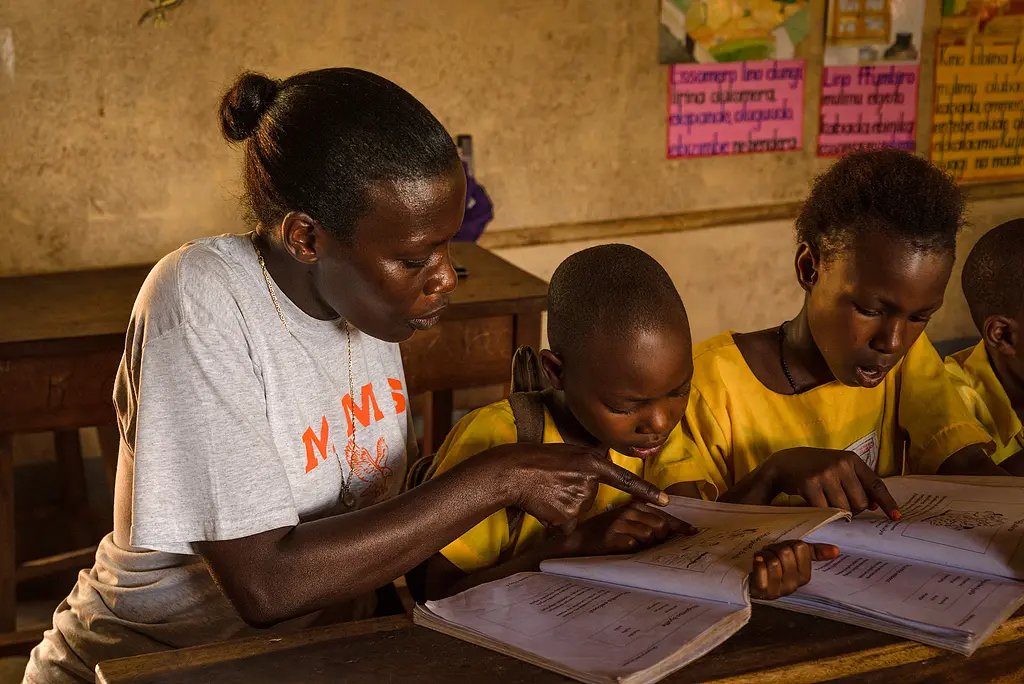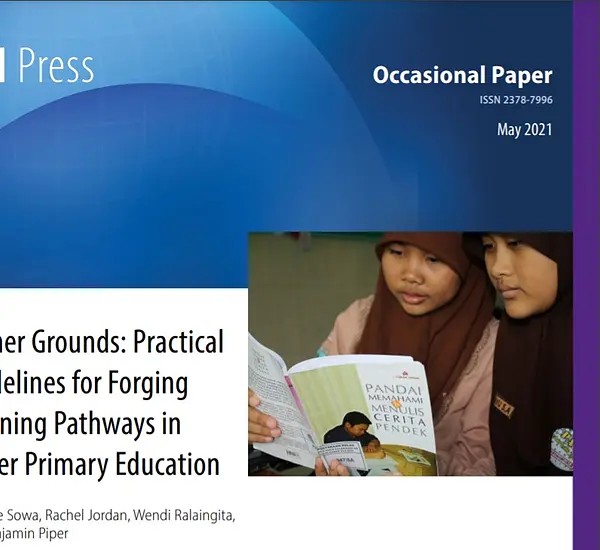
Teacher Constance of Saka Primary school hurried to Head Teacher Jessica’s office for their meeting about Amina. Amina was an early grade learning success story. Entering an intervention-supported primary school with no exposure to any printed text or numbers before grade 1, she passed grade 3 on time with grade level proficiency in both literacy and numeracy!
Unfortunately, in the following three years, Amina struggled with defining her identity, her family’s increasing demands, painful and disruptive menstrual cycles as well as instances of physical and sexual abuse in her school. So, despite her early excellent performance in the early grades and high hopes for her in upper primary, Amina struggled over the next few years. Her grades were consistently low. She started falling behind academically as the concepts being taught became increasingly complex and difficult to grasp. Her absences at school increased and Amina fell even further behind with the school closures due to COVID-19. When Teacher Constance, with her large class size and workload was finally able to pay more attention to Amina, she realized it would be virtually impossible to get her caught up for the primary school exit examinations. With her brothers out of work due to COVID-19, Amina didn’t have the money to pay for the exams anyway, so with two months left, and a proposal for her hand in marriage, she dropped out of school.
Amina’s story speaks to the challenges of supporting quality learning for learners as they transition out of lower primary—at different reading and numeracy levels, at times transitioning to a second or third language of instruction, and while experiencing changing physical, social and economic pressures now exacerbated by COVID-19.
As Dr. Patience Sowa argues in this 2019 blog post, global attention to learners in upper primary is needed to equip learners to face these changes, and to address alarmingly low literacy and numeracy rates of learners entering these grades (World Bank 2018); close disparities between the primary completion rates in different LMICs (Crouch et al 2020); fill in the dearth of research on effective upper primary interventions in LMICs; and to protect and carry forward extensive investments made in lower primary.
Where to start? For governments, donors and implementers planning upper primary interventions, RTI Press has recently published Higher Grounds: Practical Guidelines for Forging Learning Pathways in Upper Primary Education. Drawing from the initial evidence generated from LMICs and supplemented by research from higher income countries, these guidelines recommend approaches tailored specifically to upper primary, organized in five core components:
- Fostering teaching quality through professional development;
- Improving pedagogy in upper primary;
- Assessment (of, for, and as learning);
- Teaching and learning materials in upper primary; and
- SEL (social and emotional learning), school climate, and prevention of school-related gender-based violence (SRGBV) in upper primary.
The guidelines suggest successful upper primary interventions must facilitate the establishment of supportive and nurturing schools and reinforce grade- and content-appropriate teaching practices through pre-service education, in-service training, and ongoing teacher support. This type of professional development can help teachers ensure learner well-being and academic success. In this blog, we, the authors of Higher Grounds, discuss the kinds of support and conditions teachers need to implement to ensure learners like Amina flourish in school despite the challenges they may have in their lives outside of school.
Ensuring the well-being of learners
Research evidence in both high- and low-income countries indicate safe, supportive, and nurturing schools are essential to the academic success of learners. Positive school climates are important for all learners, but particularly for learners in the upper primary grades who start experiencing more intense developmental, sociocultural, and socioeconomic changes in their lives. As we discuss under Component 5 of the guidelines, teachers will need training, materials, and ongoing support to enable them to identify the warning signs of learners who are at risk, respond to the needs of these learners, as well as model and teach learners social and emotional learning skills (CASEL 2017; Frey, Fisher & Smith, 2019). These efforts should be coordinated between, and designed with input from, learners, teachers, parents, and the community. Social and emotional learning (SEL), school climate and culture, and school-related gender-based violence (SRGBV) programming are especially important to upper primary interventions as they both increase learners’ ability to respond to the unique challenges of adolescence and strengthen the network of support for them.
Finding pathways for learner success
Learning progressions are the sequence of curriculum knowledge and skills learners are expected to follow, learn, and master in subjects as they advance through school. As students move into the upper primary grades, teachers in most LMICs welcome learners at different points along the learning progression in each subject, with different levels of mastery of literacy, numeracy, and proficiency in the language of teaching and learning. To help learners achieve the desired learning outcomes, teachers must be able to use learning progressions to determine learner academic proficiency and use equitable and inclusive teaching practices to plan how to move them forward.
Professional development for increasing complexity
In numeracy, and many other content area subjects in upper primary, concepts become more abstract and complex. Therefore, pre-service teacher education and ongoing professional development must include helping teachers to pinpoint gaps in learner knowledge and to support learners in filling in these gaps, so they can progress to mastering more complex concepts. Similarly, in literacy and language teaching, professional development for teachers much ensure they are proficient in the LoTL and are equipped to skillfully manage the transition of learners from mother tongue or local languages to the LoTL.
Assessment for Learning
The strategic use of assessments, particularly assessment for learning, is crucial in identifying where learners are in the learning progression, and which gaps need to be filled. As we discuss under Component 3 of the guidelines, assessment for learning, also referred to as formative assessment, is critical in helping teachers to identify where each learner is in the learning progression, and to decide how to facilitate mastery of the desired learning outcomes. Assessment for learning should be embedded throughout pre-service teacher education and in-service teacher training, and materials should include both simple, game-like formative assessment activities that can be applied across subject areas, and templates of different methods for gathering evidence on student learning. Ongoing support to teachers should focus primarily on how teachers can interpret learner work and determine where they are struggling and how to use this information and assessment results as a whole in their planning and teaching.
In Saka Primary School, Head Teacher Jessica, with the support of Teacher Constance, the rest of the teaching staff and the community recognized that students like Amina need specific support during the critical years of upper primary. This help requires that we build the teacher and learner skills around the core areas discussed in this blog, and in Higher Grounds: engendering a positive school culture, climate and integrated SEL; using learning progressions to identify individual students abilities and needs; utilizing evidence-based strategies to explain complex and abstract concepts that build on one another; transitioning from local and mother tongue languages to the official LoTL; and conducting and using assessments to inform learning. The professional development Teacher Constance and others receive should be multifaceted and targeted to the specific needs of teachers and learners. Teacher professional development activities should include opportunities for teachers to discuss teaching and learner well-being with mentors, coaches, and peers.
With this type of consistent and targeted support for learners and themselves in place, teachers at Saka Primary will be able to more quickly identify learners who are facing challenges. They will acquire the skills and tools to discover internal and external pressures learners are facing and use interventions which help learners thrive in the upper primary grades and prepare them to succeed across their education career. With many more educators like those at Saka Primary, education systems across LMICs can ensure that upper primary is a high-quality learning environment that builds on increased outcomes in lower primary and prepares learners for what comes next.

Learn More
Read and download the authors' complete paper, published in May 2021 by RTI Press.